
News
Behind the Headlines
Two-Cents Worth
Video of the Week
News Blurbs
Articles
Testimony
Bible Questions
Internet Articles (2015)
Internet Articles (2014)
Internet
Articles (2013)
Internet Articles (2012)
Internet Articles (2011)
Internet Articles (2010)
Internet Articles
(2009)
Internet Articles (2008)
Internet Articles (2007)
Internet Articles (2006)
Internet Articles (2005)
Internet Articles (2004)
Internet Articles (2003)
Internet Articles (2002)
Internet Articles (2001)

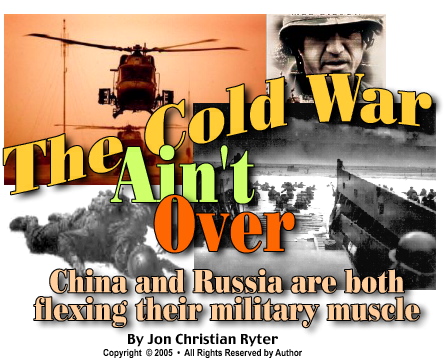
 ust
as the free enterprise capitalists are becoming more politically
and economically comfortable with Beijing and Moscow, both sent
out very clear signals last week that the century old sparring
match between Karl Marx and John D. Rockefeller
may not be over. It may, in fact, be entering round ten with
an unwanted KO—in the form of WWIII—coming at the
end of this decade as a new, structured
world government becomes an Orwellian reality.
ust
as the free enterprise capitalists are becoming more politically
and economically comfortable with Beijing and Moscow, both sent
out very clear signals last week that the century old sparring
match between Karl Marx and John D. Rockefeller
may not be over. It may, in fact, be entering round ten with
an unwanted KO—in the form of WWIII—coming at the
end of this decade as a new, structured
world government becomes an Orwellian reality. 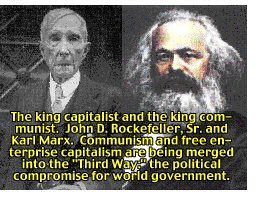 But
the global economy gurus are doing their level best to ignore
the very obvious signs that both the Bamboo and Iron curtains
are being fastidiously reconstructed since, to the world, both
communist empires have obviously joined the capitalist free
enterprise society of the West.
But
the global economy gurus are doing their level best to ignore
the very obvious signs that both the Bamboo and Iron curtains
are being fastidiously reconstructed since, to the world, both
communist empires have obviously joined the capitalist free
enterprise society of the West.
As Beijing forced
the resignationof pro-democracy Hong Kong Chief Executive Tung
Chee-hwa last week, both the New York Stock Exchange
and Nasdaq were blindly engaged in negotiating office
space in Beijing so they could more aggressively compete with
the London Stock Exchange and the Asia Stock Exchange
for the listings of lucrative sham public corporations that
are, in reality,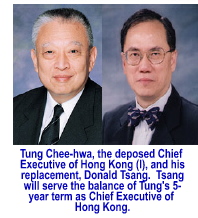 owned by Chinese Central Committee members and their friends.
owned by Chinese Central Committee members and their friends.
Tung, who
has temporarily been replaced with Donald Tsang, Chief
Secretary for Administration in the government, has been given
a face-saving "promotion" into what will be a powerless
position on a very powerful advisory committee in Beijing. He
will serve as one of nine vice-chairmen of the Chinese People's
Political Consultative Conference [CPCC] that determines
policy between China's eight "official" socialist
democratic political parties. 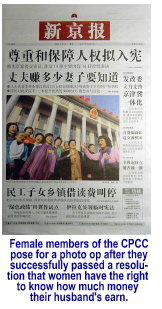 (One
of the resolutions passed last week by the CPCC [and
reported in the Beijing News] was a measure that says
Chinese women have the right to know how much money their husband's
earn. Further down the page in the same issue was an insignificant
blurb concerning two proposed constitutional amendments that
would protect private property and human rights. (As the overlords
of socialist democracy in China have learned from watching democracy
in action in the United States, it doesn't matter what any amendment
to your Constitution says—it only matters how your courts
interpret what they have decided the Constitution means today.)
(One
of the resolutions passed last week by the CPCC [and
reported in the Beijing News] was a measure that says
Chinese women have the right to know how much money their husband's
earn. Further down the page in the same issue was an insignificant
blurb concerning two proposed constitutional amendments that
would protect private property and human rights. (As the overlords
of socialist democracy in China have learned from watching democracy
in action in the United States, it doesn't matter what any amendment
to your Constitution says—it only matters how your courts
interpret what they have decided the Constitution means today.)
As Beijing's grip on Hong Kong tightened, the National People's Congress [NPC] in Beijing enacted a time-bomb piece of legislation that all but guaranteed regional instability—even as Beijing put forth its "peaceful trade partner" face to the United States last week when Chinese trade representatives assured the Bush Administration that they would voluntarily curb clothing exports to America to avoid sanctions. It is interesting that the vote in the NPC on that time-bomb legislation came one day after Chinese president Hu Jintao replaced former president Jiang Zemin as the head of the State military commission and the defacto head of the People's Liberation Army.
Hardliners in the
Chinese Central Committee pushed an anti-secession law through
the NPC that will automatically trigger military action
against Taiwan should the island nation move toward formal independence
from the mainland—or even make overt signs which appear
that it is. 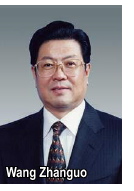 When
the Bush Administration condemned the proposed legislation
and called for Beijing to rethink its actions last week, Chinese
officials attempted to blunt the impact of the new threat against
Taiwan by insisting that the "nonpeaceful means" dictated
by the law would be used only as "a last resort."
Wang Zhanguo, a senior official in the NPC said
the muscle-flexing anti-secession law was actually aimed at
assuring the peaceful reunification of the two Chinas. Fear
is the best "adhesive" known to man.
When
the Bush Administration condemned the proposed legislation
and called for Beijing to rethink its actions last week, Chinese
officials attempted to blunt the impact of the new threat against
Taiwan by insisting that the "nonpeaceful means" dictated
by the law would be used only as "a last resort."
Wang Zhanguo, a senior official in the NPC said
the muscle-flexing anti-secession law was actually aimed at
assuring the peaceful reunification of the two Chinas. Fear
is the best "adhesive" known to man.
Taiwan condemned the new law as a brutal attempt to deny the people of Taiwan freedom of choice by giving Beijing a blank check to invade the island nation anytime it chose to do so. The new law mandates action if Taiwanese independence forces "under any name or by any means" causes the secession of Taiwan from mainland China*. (See footnote, below.) In addition, the communist overlords in Beijing believe that by staking out their position as clearly as they did, that support for Taiwan in the United States will diminish as the American people walk away from commitments they have made to Taiwan since 1946.
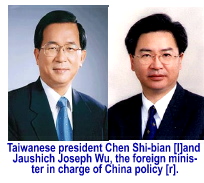 Beijing's
move at this time is based in part on their conviction that
the United States is overextended and will not come to the aid
of Taiwan if Taiwan's pro-democracy president, Chen Shi-bian
decided to go ahead with his proposed plan to rewrite the Taiwanese
constitution that would declare the island nation to be an independent,
sovereign country. China has warned Chen through Joseph
Wu, minister in charge of China policy, that such a declaration
would be viewed by the mainland as an act of war and that, provoked,
Beijing would be obligated to respond with "nonpeaceful
means" to put down the insurgency. Furthermore, with China
treating its invasion of Taiwan as an internal matter before
the UN, the United States would be hard-pressed to convince
the international community that the People's Republic of
China had invaded a sovereign nation without provocation.
China's success or failure in reining in its "renegade
province" will determine, to a large degree, Russia's course
of action in "recalling" its former satellites when,
and if, that nation feels a need to do so to fight what Russian
president Vladimir Putin feels is a growing threat from
an increasingly powerful European Union.
Beijing's
move at this time is based in part on their conviction that
the United States is overextended and will not come to the aid
of Taiwan if Taiwan's pro-democracy president, Chen Shi-bian
decided to go ahead with his proposed plan to rewrite the Taiwanese
constitution that would declare the island nation to be an independent,
sovereign country. China has warned Chen through Joseph
Wu, minister in charge of China policy, that such a declaration
would be viewed by the mainland as an act of war and that, provoked,
Beijing would be obligated to respond with "nonpeaceful
means" to put down the insurgency. Furthermore, with China
treating its invasion of Taiwan as an internal matter before
the UN, the United States would be hard-pressed to convince
the international community that the People's Republic of
China had invaded a sovereign nation without provocation.
China's success or failure in reining in its "renegade
province" will determine, to a large degree, Russia's course
of action in "recalling" its former satellites when,
and if, that nation feels a need to do so to fight what Russian
president Vladimir Putin feels is a growing threat from
an increasingly powerful European Union.
Bush press secretary Scott McClellan said Beijing's passage of the law was "unfortunate," adding that "...[w]e oppose any attempt to determine the future of Taiwan by anything other than peaceful means...We don't want to see any unilateral attempts that would increase tensions in the region. So, this is not helpful."
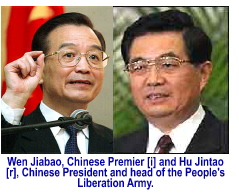 Perhaps,
but Beijing knew that both the timing of the new law—and
the macho rhetoric that accompanied it—would be helpful
to them within the Asian community. At a news conference on
Monday, Chinese Premier Wen Jiabao said that China was
not afraid of a military confrontation with the United States
over Taiwan but that Chinese President Hu Jintao—who
now also heads the People's Liberation Army, considered
military action a "last resort."
Perhaps,
but Beijing knew that both the timing of the new law—and
the macho rhetoric that accompanied it—would be helpful
to them within the Asian community. At a news conference on
Monday, Chinese Premier Wen Jiabao said that China was
not afraid of a military confrontation with the United States
over Taiwan but that Chinese President Hu Jintao—who
now also heads the People's Liberation Army, considered
military action a "last resort."
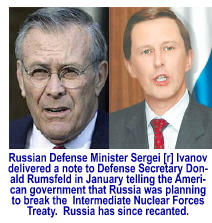 Long
before America's new Secretary of State Condoleeza Rice
got her feet wet in the cold water of the Straits of Taiwan,
Russia's Defense Minister Sergei Ivanov notified American
Defense Secretary Donald Rumsfeld in a January meeting
in Washington, DC that Moscow was going to withdraw from a key
nuclear missile disarmament treaty. The timing of the decision
seemed right to Moscow because of the friction between the Americans
and the European Union—and because Russia views NATO
a new threat to its national interests since many of its former
satellites—which the Kremlin still consider to be part
of Russia—now belong to NATO. Many of those former
captive nations are seeking membership in the European Union.
Long
before America's new Secretary of State Condoleeza Rice
got her feet wet in the cold water of the Straits of Taiwan,
Russia's Defense Minister Sergei Ivanov notified American
Defense Secretary Donald Rumsfeld in a January meeting
in Washington, DC that Moscow was going to withdraw from a key
nuclear missile disarmament treaty. The timing of the decision
seemed right to Moscow because of the friction between the Americans
and the European Union—and because Russia views NATO
a new threat to its national interests since many of its former
satellites—which the Kremlin still consider to be part
of Russia—now belong to NATO. Many of those former
captive nations are seeking membership in the European Union.
The treaty in question is the Intermediate Range Nuclear Forces Treaty that eliminated an entire class of both nuclear and conventional ground-launched missiles with ranges from 500 to 5,000 km—sufficient to reach any target in Europe (but not America). Some 2,692 such weapons were destroyed during the 1990s. Bulgaria was the last Soviet satellite to destroy their stockpile. That happened in 2002—11 years after the treaty was signed—with the U.S. paying for the demolition of the weapons. After a series of calls between Bush and Russian President Vladimir Putin, the hawkish Russian military learned that the cowboy in the White House had at least one Reaganesque quality—he convinced Putin to hold his powder. A delegation from Russia's Foreign Ministry traveled to Washington and formally withdrew the proposal.
However, the fact that Russia was debating military options to deal with what Moscow perceives behind closed doors in the Kremlin as new threats from the West is indicative of a serious deterioration in U.S-Soviet relations—or as least, Soviet-European Union relations. Arms control experts expressed concern that the collapse of the 1987 treaty would be a disaster for nonproliferation detente, and would signal a return to the Cold War years and a new phase of 21st century weapons proliferation. While the United States has honored the terms of the nonproliferation treaties it has signed, neither Russia nor China has lived up to the terms of any of the weapons control treaties either has signed. As Russia publicly destroyed obsolete and flawed 20th century weapons systems, they have been replacing them with space age 21st century weaponry financed in part by the United States through dollars obtained through trade, IMF loans, or money given to Moscow by Washington to dismantle obsolete nuclear weapons. Over the past 30 years, as Russia publicly destroyed obsolete weapons systems, it continued to develop new 21st century weaponry. Many of the nuclear warheads that were removed from the obsolete systems (that conspiracy buffs in the United States believe are now suitcase bombs in the hands of Islamic terrorist groups, or are in the possession of rogue military leaders who are selling them on Ebay) were simply remounted on sophisticated new weapons, and are now aimed at targets deep in the heartland of America.
*In point of fact, Taiwan (formerly Formosa) was an independent nation since 1945 when it was granted sovereignty by Articles 76 and 77 of the UN Charter. While Formosa was historically a part of China, in April 1895 Japan forced the Qing Dynasty to sign the Treaty of Shimonoseki which ceded Formosa to Japan. Under the terms of the Potsdam Conference signed by China, England and the United States at the end of World War II, the Axis would be forced to surrender captured lands back to the nations from which they were taken. However the Atlantic Charter (1940) which became the UN Charter (1945)—which China signed—both predates and postdates the Potsdam Proclamation and negates China's claims of sovereignty over Taiwan since it was Nationalist China and not Communist China which signed both agreements). Furthermore, until Richard Nixon shocked the free world by recognizing The People's Republic of China as the legitimate government of China, Nationalist China (Taiwan) was viewed as the legal government of both China and Taiwan.Wth Nixon's recognition of the People's Republic of China as the "legal China," the UN replaced Taipai's seat on the Security Council with a representative from Beijing. Nationalist China was no longer recognized as a government-in-exile and Taiwan's embassy in Washington, DC was reclassified as a Trade Mission.

Copyright © 2009 Jon Christian Ryter.
All rights reserved.


